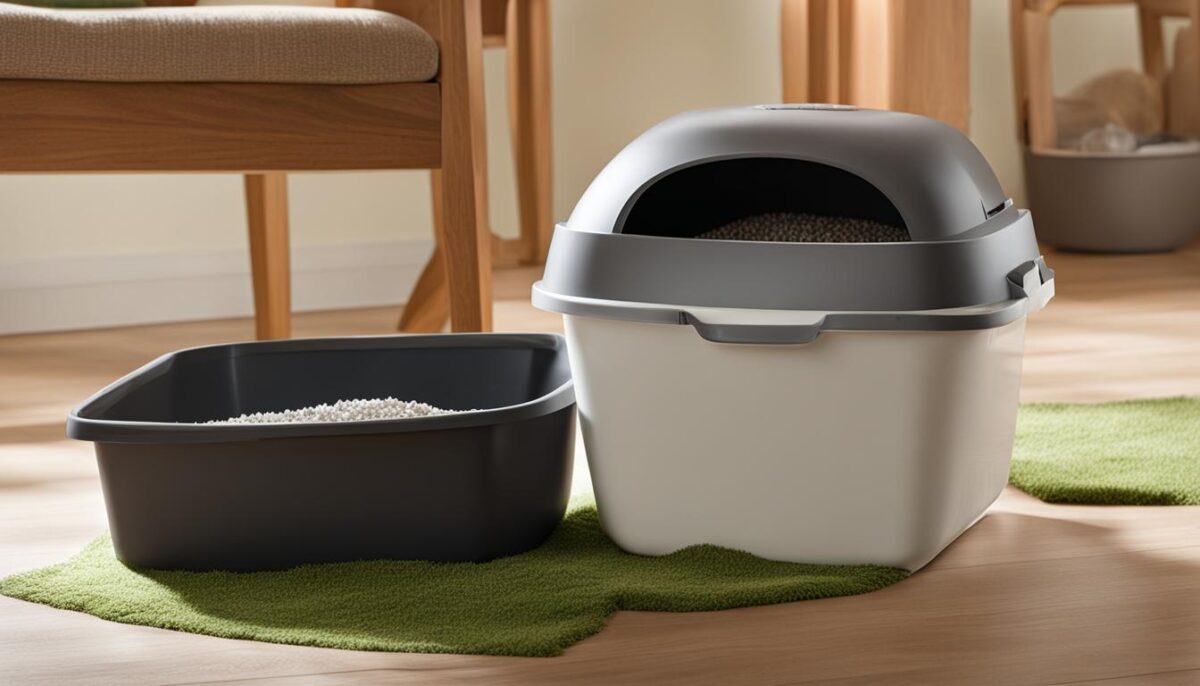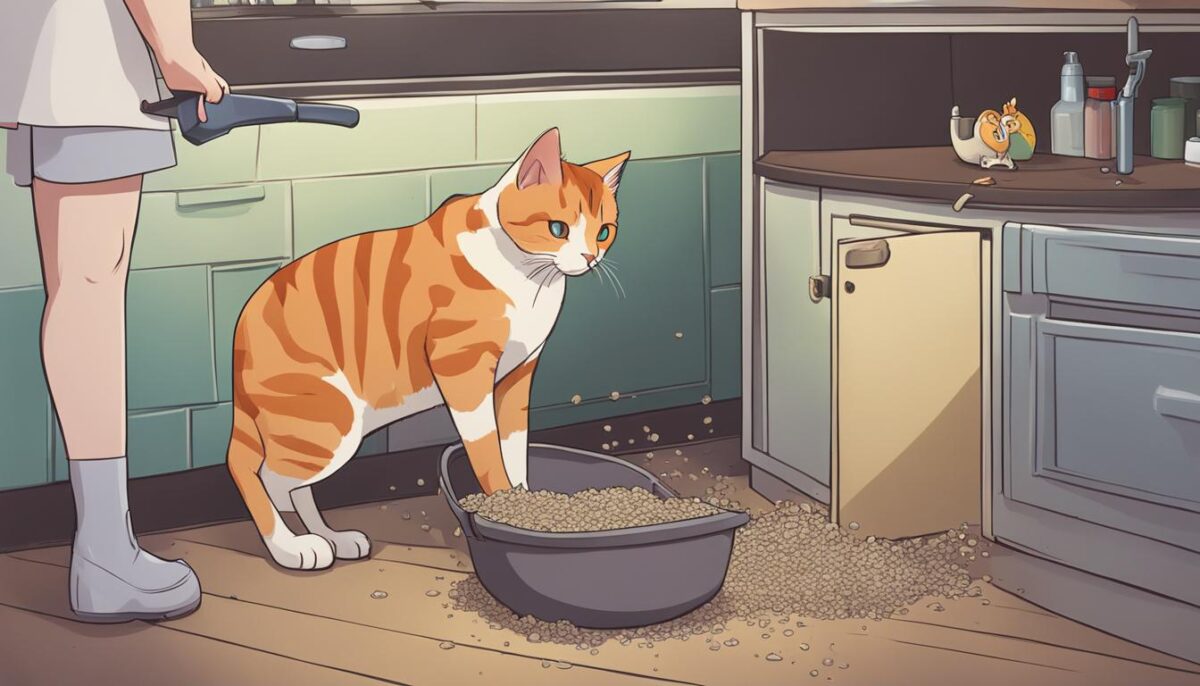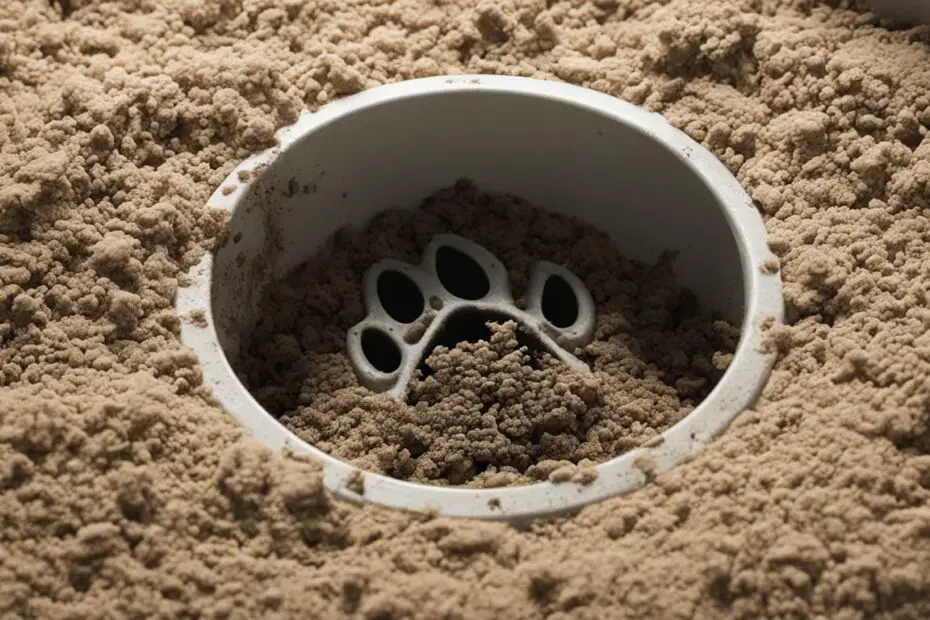Welcome, cat owners! Do you find yourself dealing with the unpleasant odor of your cat’s poop? You’re not alone. While some odor is natural, excessively smelly cat poop can be a sign of an underlying issue. Monitoring your cat’s bowel movements is essential for their overall well-being. In this article, we will explore the potential causes of cat poop odor, including diet, bacteria, parasites, medications, anal gland infections, and digestive disorders.
Key Takeaways:
- Smelly cat poop can indicate an underlying issue.
- Diet plays a significant role in the odor of your cat’s poop.
- Bacterial infections can contribute to foul-smelling feces.
- Parasites are a common cause of smelly cat poop.
- Some medications and anal gland infections can also affect the smell of cat poop.
The Impact of Diet on Cat Poop Odor
The food your cat eats plays a significant role in the odor of their poop. Certain foods, such as those high in vitamins or grains, can cause smelly poop in cats. Additionally, cats that eat protein-rich foods like bugs, rodents, or small reptiles may also have a stronger odor in their feces. If you suspect that your cat’s diet is causing the foul smell, consider switching to a higher-quality cat food or eliminating certain ingredients from their diet.
The quality and composition of your cat’s diet can directly affect the odor of their poop. It is important to choose cat foods that are specifically formulated to promote digestive health and minimize unpleasant odors. Look for cat foods with natural ingredients and limited fillers, as these can contribute to stronger smells in the litter box.
When selecting cat food, pay attention to the protein source. High-quality protein sources, such as chicken, fish, or turkey, are more easily digestible and can result in less smelly poop. Avoid cat foods that contain meat by-products or artificial additives, as these can cause digestive disturbances and increase odor.
Tips for Controlling Cat Poop Odor Through Diet:
- Choose a high-quality cat food that is specifically formulated to minimize odor.
- Look for natural ingredients and avoid foods with fillers or artificial additives.
- Opt for protein-rich cat foods with easily digestible protein sources.
- Consider a gradual transition to a new diet to prevent digestive upset.
- Monitor your cat’s response to the new diet and make adjustments as needed.
By paying attention to your cat’s diet and making informed choices about their food, you can help reduce and control the odor of their poop. However, if the smell persists despite dietary changes, it is recommended to consult with a veterinarian to rule out any underlying health issues.

Bacterial Infections and Smelly Cat Poop
Bacterial infections can contribute to the unpleasant odor of your cat’s poop. When a cat consumes prey that is infected with bacteria such as salmonella or E.coli, it can result in foul-smelling feces. If you notice a persistent unpleasant smell coming from your cat’s litter box, it’s essential to consider the possibility of a bacterial infection.
Symptoms of a bacterial infection in cats may include:
- Fever
- Diarrhea
- Nausea
- Vomiting
Seek Veterinary Attention
If you suspect that your cat has a bacterial infection, it is crucial to seek veterinary attention promptly. Bacterial infections can worsen if left untreated, and advanced cases can even be life-threatening for your furry friend. A veterinarian will be able to diagnose the infection and prescribe the appropriate treatment to address the underlying cause of the smelly poop.
Preventing Bacterial Infections
To reduce the risk of bacterial infections in cats, it’s important to take preventive measures:
- Ensure your cat’s food and water bowls are kept clean.
- Thoroughly cook any raw or homemade cat food to kill any potential bacteria.
- Regularly clean your cat’s litter box and surrounding area to minimize bacterial growth.
- Keep your cat’s living environment clean and free from potential sources of bacterial contamination.

Parasites and Smelly Cat Poop
Intestinal parasites can contribute to the unpleasant odor of your cat’s poop. These parasites are commonly acquired by kittens from their mother or by adult cats through contact with infected cats, fleas, or consumption of infected rodents. Some of the most common parasites found in cats include Giardia, Coccidia, and Trichomonas, all of which can cause foul-smelling feces.
It is essential to address parasite infections promptly to prevent further discomfort for your cat and eliminate the smell from their poop. Treatment for parasite infections typically involves medication prescribed by a veterinarian. Your vet will conduct diagnostic tests to identify the specific parasite and prescribe the appropriate treatment regimen. Following the prescribed treatment and maintaining good hygiene practices will help eliminate the odor associated with parasites.
Preventing Parasite Infections in Cats
Prevention is key when it comes to parasite infections in cats. Here are some tips to help minimize the risk:
- Keep your cat’s environment clean and free from feces.
- Practice regular deworming according to your veterinarian’s recommendations.
- Maintain good flea control by using appropriate flea prevention products.
- Ensure your cat’s food and water are kept in clean bowls.
- Discourage your cat from hunting and consuming prey that may be infected.

| Parasite | Symptoms | Treatment |
|---|---|---|
| Giardia | Diarrhea, gas, bloating, weight loss | Medication prescribed by a veterinarian |
| Coccidia | Diarrhea, vomiting, loss of appetite | Medication prescribed by a veterinarian |
| Trichomonas | Diarrhea, weight loss, excessive grooming | Medication prescribed by a veterinarian |
Medications and Anal Gland Infections
Some cat medications and supplements can alter the natural balance of gut bacteria and cause smelly cat poop. Antibiotics, in particular, are known to affect digestive bacteria and can lead to foul-smelling feces. Anal gland infections can also contribute to the smell of cat poop. If the anal glands become infected or clogged, the resulting discharge can have a strong odor. In both cases, consulting with a veterinarian is recommended to address the underlying cause.
| Medications and Supplements | Effect on Cat Poop Odor |
|---|---|
| Antibiotics | Can alter digestive bacteria and cause foul-smelling feces |
| Other medications | May have similar effects depending on the specific drug |
| Supplements | Can also disrupt gut bacteria and contribute to unpleasant odor |
Consulting with a Veterinarian
If you notice a significant change in your cat’s poop odor after starting a new medication or supplement, it’s important to consult with a veterinarian. They can determine if the medication or supplement is the cause and recommend alternative options if necessary. When it comes to anal gland infections, a veterinarian can examine your cat and provide appropriate treatment. This may involve expressing the anal glands or prescribing medication to treat the infection.
Conclusion
Smelly cat poop is not just unpleasant to the nose; it can also be a sign of underlying health issues in your furry friend. By monitoring your cat’s poop and taking action when necessary, you can address the root causes of the odor and ensure your cat’s overall well-being.
There are several potential culprits for smelly cat poop, including diet, bacterial infections, parasites, medications, anal gland infections, and digestive disorders. If you notice a persistent odor or any other concerning symptoms, it is crucial to seek veterinary attention.
Eliminating cat poop smell begins with identifying the root cause. If you suspect your cat’s diet is contributing to the odor, consider switching to a higher-quality cat food or adjusting their diet accordingly. Bacterial infections and parasites can be treated with medication prescribed by a veterinarian.
Remember, maintaining good cat poop odor control goes hand in hand with your cat’s overall health. By addressing any issues promptly and effectively, you can create a more pleasant living environment for both you and your feline companion.
FAQ
Why does my cat’s poop have a strong and unpleasant odor?
There are several potential causes of smelly cat poop, including diet, bacteria, parasites, medications, anal gland infections, and digestive disorders.
Can my cat’s diet contribute to the odor of their poop?
Yes, certain foods, such as those high in vitamins or grains, can cause smelly poop in cats. Cats that eat protein-rich foods like bugs, rodents, or small reptiles may also have a stronger odor in their feces.
Can bacterial infections affect the smell of my cat’s poop?
Yes, if your cat consumes prey infected with bacteria like salmonella or E.coli, it can result in foul-smelling feces. Symptoms may include fever, diarrhea, nausea, and vomiting.
Can parasites cause smelly cat poop?
Yes, intestinal parasites like Giardia, Coccidia, and Trichomonas can cause foul-smelling feces. Kittens can acquire these parasites from their mother, while adult cats can get them from infected cats, fleas, or by hunting and eating infected rodents.
Can medications and anal gland infections contribute to smelly cat poop?
Yes, certain medications and supplements can alter the balance of gut bacteria and cause foul-smelling feces. Antibiotics, in particular, are known to affect digestive bacteria. Anal gland infections can also contribute to the smell of cat poop if the glands become infected or clogged.
How can I address my cat’s smelly poop problem?
By addressing the underlying cause, such as diet, bacterial infections, parasites, medications, or anal gland infections, you can help improve your cat’s overall health and create a more pleasant environment in your home.

